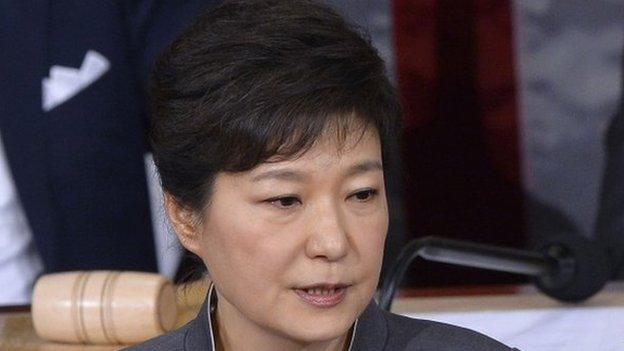Mers outbreak: How South Korea is coping
- Published
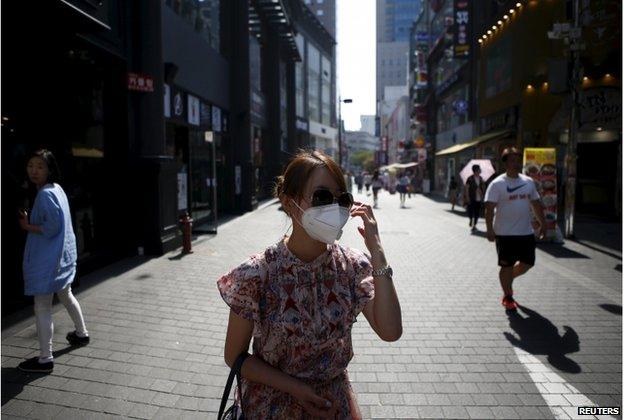
People in South Korea have been donning face masks, and public areas have appeared less crowded
From an economic slowdown to a curtailment in public social life, the Middle East Respiratory Syndrome (Mers) outbreak in South Korea has taken a toll beyond those killed or infected with the virus.
With 10 dead in South Korea, public confidence has faltered as authorities have failed to swiftly halt the spread of the disease. This has contributed to an atmosphere of uncertainty.
South Korean authorities have issued guidelines, external, advising people to "avoid visiting crowded places as much as possible" and to wear face masks in public. It has also advised against "close contact with people who have fever and heavy breathing".
Some buildings have set up temperature screening booths at their receptions.
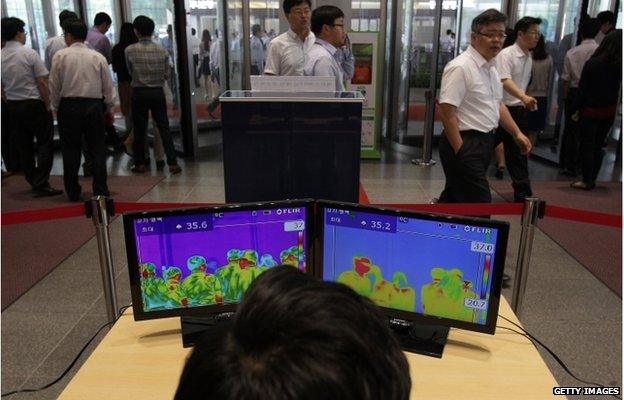
One of the symptoms of Mers is a heightened body temperature
It appears that to some extent, South Koreans have been heeding the advice. People wearing masks on the streets of South Korea's cities have become a common sight.
Baseball games, cinemas, churches, shopping malls and theme parks have reported lower visitor volumes, according to news agencies.
Some South Koreans are choosing to get groceries delivered to them at home instead of venturing out.
E-Mart and Lotte Mart, two of the country's biggest supermarket chains, saw weekly sales in store drop by 12% while online sales went up by 50%, reported AFP news agency.
Supermarket staff have also been wiping down supermarket trolley handles before and after use.
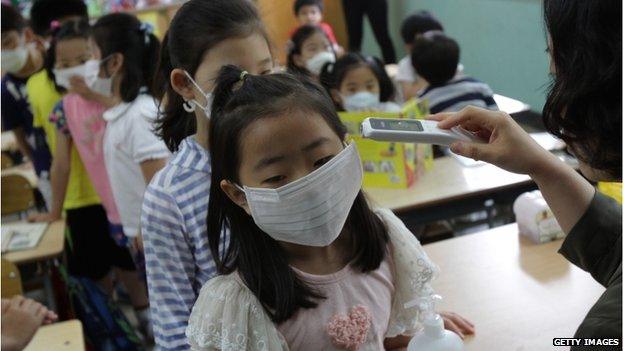
Teachers have been regularly taking the temperatures of students at the schools which have stayed open
Nearly 2,500 schools have been temporarily shut, while health workers have been spraying down subway stations and the insides of train carriages.
Subways trains are being disinfected in a bid to fight the virus, as Stephen Evans reports
After facing intense criticism that it was not doing enough, the government has stepped up efforts to put out more timely information and allay public panic.
It has launched a website dedicated to Mers updates, Acting Prime Minister Choi Kyung-hwan was photographed, external shaking hands with shop owners, and President Park Geun-hye postponed a trip to the US vowing to put a "quick end" to the outbreak.
Police have charged eight people for allegedly spreading rumours falsely naming hospitals treating Mers patients and disclosing patient information without consent, reported Yonhap news agency., external
Village lockdown
More than 3,800 people remain under quarantine - either monitored in hospitals or at home. Those at home are being tracked by their mobile phones.
But one entire village has been put on lockdown.
More than 100 residents of Jangduk in North Jeolla province have been barred from leaving and from receiving visitors since last Friday, when one case of Mers was confirmed.
The elderly woman had earlier sought treatment at a hospital where Mers patients were being treated.
While she is now in another nearby hospital, the whole village has been isolated, with all entry roads guarded by sentries.
Health workers have been taking residents' temperatures twice a day, and the government and other villages have been providing food and supplies.
"We are not in the middle of war, and didn't get any advance notice," a resident told Reuters news agency over the phone.
Mask fun
Amid the public unease, some South Koreans have tried to make light of the situation - including this Seoul wedding party whose picture has gone viral online.
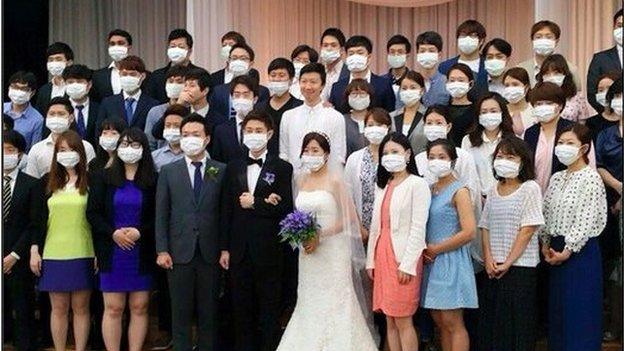
At least two guests refused to wear masks for the picture
Wedding organiser Sewing for The Soil told the BBC's Kevin Kim in Seoul that they provided masks at the ceremony last Saturday in case guests needed them.
"After taking the main wedding photos, we thought it would be fun if we took a group photo with everybody with the masks on, and the bride and groom agreed... it was all fun and light-hearted," said a spokesman.
Actors and singers have also started posting pictures of themselves wearing masks on their social media accounts, prompting a wave of "mask selfies", reported The Korea Herald., external
Some have used it as an opportunity to encourage better health practices. "Wash your hands, wear a mask (to) avoid Mers," wrote pop singer Zico.
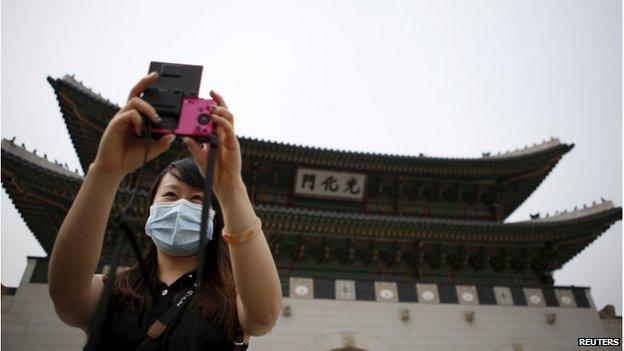
"Mask selfies" have become a trend among some South Koreans as well as tourists
Culture curtailment
But Korean pop music or K-Pop, one of South Korea's most famous cultural exports, has itself not been immune to the slowdown, with several singers postponing their national tours.
A rap music festival which was due to be held in Seoul last weekend has also been cancelled.
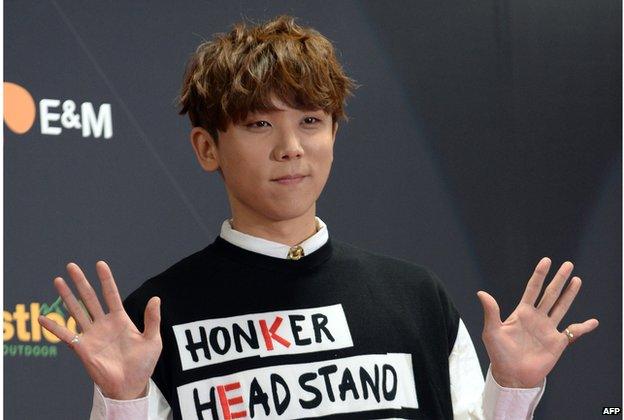
Popular rapper Junggigo was among those slated to appear at the Black Music Stage festival which was cancelled
Arts and cultural centres in the cities of Busan, Jeju and Yongin have cancelled performances, reported The Korea Herald, external, and film distributors have postponed releases as cinema ticket sales have plummeted by 25%.
An international book fair due to open next week has also been put back to mid-October, while agricultural events, such as the Mountain Berry and Watermelon Festival in Gochang county, have been cancelled.
Tourism drop-off
Known for its shopping and beautiful landscapes, South Korea is a magnet for visitors in the region.
But since the outbreak began more than 54,000 tourists have cancelled their bookings, according to tourism authorities.
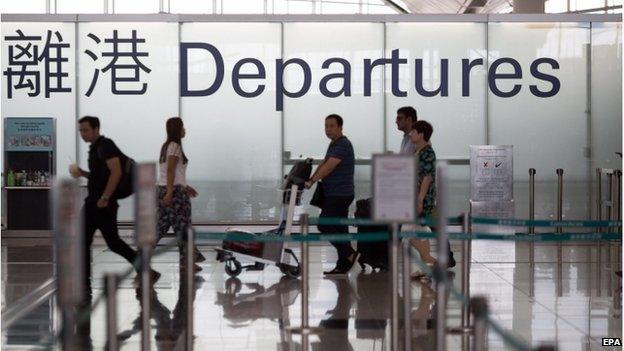
Hong Kong has advised its residents not to visit South Korea unless necessary
Many of those cancelling flights are from Hong Kong, mainland China, Taiwan and Singapore, according to travel analysis firm ForwardKeys.
Hong Kong issued a travel alert earlier this week advising against non-essential travel to South Korea, while other governments such as Taiwan have called on travellers to take precautions.
The trend has had an industry-wide effect with hotels, travel agencies and duty free retailers reporting lower sales figures.
In a press release, Mario Hardy, the chief executive of the Pacific Asia Travel Association, called for transparency from the authorities "so that the travelling public are in full possession of all the facts and there is no unnecessary alarm and panic".
- Published11 June 2015
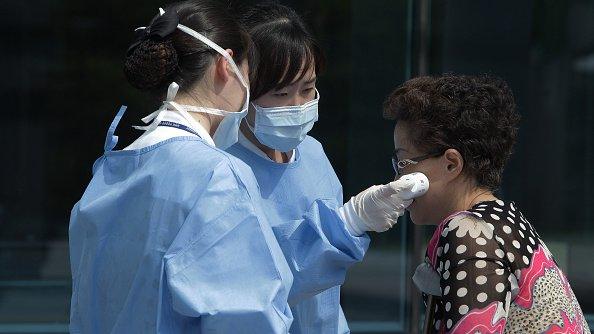
- Published10 June 2015
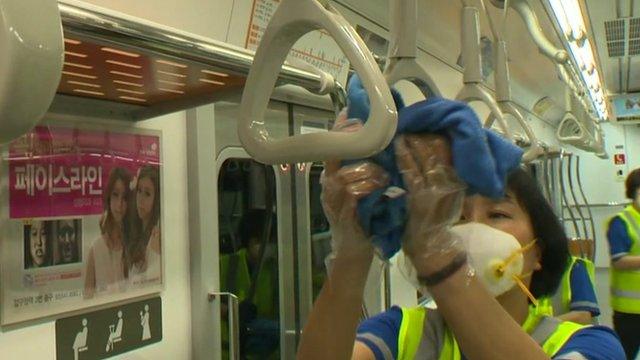
- Published10 June 2015
